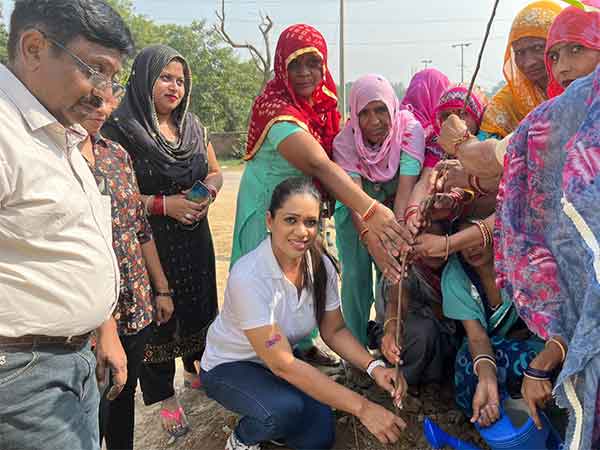Civil Aviation Minister Naidu stresses upon the need of indigenous civil aircraft development
Oct 28, 2024

Bengaluru (Karnataka) [India], October 28 : Civil Aviation Minister Kinjarapu Rammohan Naidu on Monday emphasised the importance of developing indigenous civil aircraft to showcase India's expertise and strengthen its position as a preferred destination for aerospace component manufacturing, from initial design to final production, according to an official press release.
Addressing staff at the Council of Scientific and Industrial Research-National Aerospace Laboratories (CSIR-NAL), the Ministry of Civil Aviation, the Directorate General of Civil Aviation (DGCA), flight training organisations (FTOs), and aerospace industry representatives in Bengaluru, Minister Naidu underscored Prime Minister Narendra Modi's vision for India to become a leading aviation hub by the end of the decade and achieve Viksit Bharat by 2047.
"India has a competitive advantage in the aerospace industry, supported by a qualified workforce of engineers, scientists, and IT graduates; an established base of parts and components; robust manufacturing expertise; and advanced academic institutions and R&D infrastructure. Many aerospace companies are considering India as a destination for manufacturing and MRO services. However, for India to become a significant player in the global aerospace industry, including both civil and defence sectors, we must address existing technological gaps--a critical challenge for Indian companies," Naidu stated.
"Our institutions need to keep pace with the increasing reliance on technology across the design lifecycle. Many foreign companies remain reluctant to transfer cutting-edge technology to India without significant management control, often providing licences for older technologies instead. This has hindered Indian companies' competitiveness in the global market. Consequently, our R&D labs must produce globally competitive innovations to strengthen our aviation industry and realise our Prime Minister's vision for 'Viksit Bharat 2047'. This requires disruptive innovation," he added.
Reflecting on CSIR-NAL's significant contributions to both civil and defence aerospace sectors over the past 65 years, Naidu praised the laboratory's work on major national civil aircraft programmes. He acknowledged NAL's contributions to the development of the indigenous two-seater trainer aircraft Hansa-3 (NG), the Saras MK-2 Light Transport Aircraft currently under development, and the advancements in the Project Definition Phase (PDP) of the Regional Transport Aircraft (RTA) programme.
Naidu also expressed his appreciation for the positive responses received from FTOs for CSIR-NAL's Hansa-NG aircraft, along with the interest shown by production agencies in commercialising it to meet FTO demand. He highlighted the Ministry's plans to increase the number of FTOs from the current 37 to over 80 in the next five years, accommodating the country's growing pilot training needs, and noted that the Government has already reduced customs tax on aircraft parts to 5%, with plans to extend this to imported raw materials to support local manufacturing and promote indigenous technologies.
The RTA 90-seat turboprop aircraft aims to bolster domestic aviation manufacturing capabilities and reduce dependence on foreign manufacturers. The Ministry of Civil Aviation (MoCA) is committed to supporting this programme and has initiated the formation of an SPV to develop the manufacturing ecosystem, followed by the launch of Full Scale Engineering Development within India. Naidu applauded CSIR-NAL, along with DRDO and HAL, for leading the PDP phase and working on indigenous design and development of LRUs and systems to meet the RTA requirements.
He expressed satisfaction with the interest shown by global companies such as Airbus and Boeing in joining the RTA programme. This collaboration is expected to accelerate development, enhance innovation, and increase the RTA's competitiveness on the global stage, marking a significant step in India's aerospace manufacturing journey.
Naidu commended CSIR-NAL for building advanced national test facilities that are not only among the best in the country but also comparable to similar facilities worldwide. He particularly appreciated CSIR-NAL's success in the flight demonstration of a 1:3 scale High Altitude Platform (HAP) powered by solar and battery for 24x7 operations, and he looks forward to the full-scale HAP demonstration, which would place India among the first three countries to achieve this for communication and surveillance applications.
He acknowledged CSIR-NAL's swift response to MoCA's initiatives on developing eVTOL aircraft and Urban Air Taxi (UAT) to address current needs. He was pleased to learn of the laboratory's conceptualisation of a National Drone Hub at Begumpet Airport in collaboration with the Civil Aviation Research Organisation (CARO-AAI), BEL, the Drone Federation of India, and private industry. He commended CSIR-NAL scientists for their ambitious roadmap for growth in the aerospace sector under Aerospace Projects of National Importance (APNI), including initiatives like Electric Hansa (e-Hansa), Urban Air Taxi, and a four-seater aircraft--all expected to contribute to the vision of "Viksit Bharat 2047."
On this occasion, Naidu also released the Aircraft Manuals for Hansa-NG, intended to benefit FTOs and aircraft manufacturers.

















